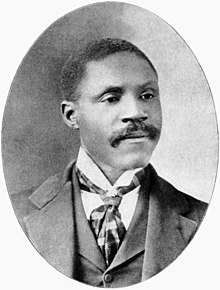George W. Murray
| George W. Murray | |
|---|---|
 |
|
| Member of the U.S. House of Representatives from South Carolina's 7th district |
|
|
In office March 4, 1893 – March 3, 1895 |
|
| Preceded by | William Elliott |
| Succeeded by | J. William Stokes |
| Member of the U.S. House of Representatives from South Carolina's 1st district |
|
|
In office June 4, 1896 – March 3, 1897 |
|
| Preceded by | William Elliott |
| Succeeded by | William Elliott |
| Personal details | |
| Born |
George Washington Murray September 22, 1853 Sumter County, South Carolina |
| Died | April 21, 1926 (aged 72) Chicago, Illinois |
| Nationality | American |
| Political party | Republican |
| Spouse(s) | Ella |
| Alma mater | University of South Carolina |
| Profession | Teacher, politician |
George Washington Murray (September 22, 1853 – April 21, 1926), born into slavery in South Carolina, became educated and worked as a teacher, farmer and politician. After serving as chairman of the Sumter County Republican Party, he was elected in the 1890s as a United States congressman from South Carolina. He was the only black member in the 53rd and 54th Congresses. Because South Carolina passed a constitution in 1895 that effectively disenfranchised blacks and crippled the Republican Party, Murray was the last Republican elected in the state for nearly 100 years. The next Republican, elected in 1980, was the result of a realignment of voters and parties; he was white.
In 1905 Murray was convicted of forgery in what he said was a discriminatory trial (with an all-white jury) and sentenced to three years' hard labor. He left the state and moved to Chicago. In 1915 he was pardoned in this case by the South Carolina governor, Coleman Blease. In Chicago, Murray again became active in the Republican Party. He lectured on race relations and his political career, and published two collections of his speeches. He died of a stroke April 21, 1926.
Murray was born into slavery on September 22, 1853, on a cotton plantation near Rembert, Sumter County, South Carolina, in the Piedmont region. His parents' names are not known, and they died during the Civil War. He had two brothers, Prince and Frank. Murray did not have formal schooling as a boy, but still managed to learn to read and write. After the war, he was a teacher from 1871-1874. He entered the University of South Carolina at Columbia in 1874 when it was opened to black students by the Republican-dominated legislature.
...
Wikipedia
